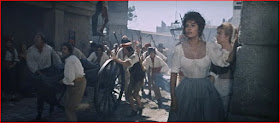1961 was a high-water mark of the Italian invasion of American movie theaters. Federico Fellini's La Dolce Vita became a breakout blockbuster, while Sophia Loren became the first performer to win an acting Oscar for a foreign-language performance, copping Best Actress for Vittorio de Sica's Two Women, and Hercules movies and related peplums played across the land. Loren personally bridged the two cinematic superpowers, having built up her English-language stardom over several years in Hollywood in the late 1950s. In 1961, as Two Women opened in the big U.S. markets and Anthony Mann's El Cid proved another international hit, Loren invaded France. She took on a beloved historical-theatrical role that had been played by Gloria Swanson in a lost silent film: Catherine "Madame Sans-Gene" ("Shameless") Lefebvre, who rose from laundress to Duchess of Danzig in Revolutionary and Napoleonic France. Despite the language barrier (which Loren traversed with apparent ease), the star seemed natural for a character who becomes a princess while retaining an earthy irreverence.
Catherine's main claim to fame is having been the personal laundress of Corporal Napoleon Bonaparte during his humble early days in the army of the Revolution. As early as 1792, she thinks her "little Bonaparte" (he insists on the Corsican spelling, Buonaparte) has enough clout to evict a cannon from her little courtyard near the besieged Tuileries palace, but Napoleon (Julien Bertheau) gets carried away with tactics and orders one of her gates removed to give the cannon a clearer shot. Sensitive Sgt. Francois Lefebvre (Robert Hossein) promises to repair the gate when the fighting ends. Catherine nearly gets shot by stray bullets while watching the street fighting, and never gets her gate replaced. Lefebvre marches off with his troops to fight the Austrians, while a frustrated Napoleon heads home to Corsica, promising to repay Catherine some day for washing his two white shirts.
Four years later, Bonaparte is a general and French armies are on the offensive. Catherine has become a cook for the troops and re-encounters Francois, renewing their amorous acquaintance before both are captured by the Austrians. Confined in a windmill (Francois is considered AWOL by Napoleon), the pair manage a tricky escape and blow up the enemy's ammo stores. For his heroic act, Francois is made Duke of Danzig, and once Napoleon becomes Emperor he has an even bigger role in store for Francois and Catherine.
The comedy of the story derives from the reign of parvenus spread through Europe by Napoleon. He has elevated many a man of humble background to high rank in the army while putting crowns on the heads of as many of his relatives as he can. But while nepotism comes naturally to him, he also feels that his siblings are unworthy -- or at least that it's unbecoming of them to bitch about his plans for other European thrones. His brother Jerome, for instance, resents the Emperor's plan to make the Lefebvres King and Queen of Westphalia, and his sisters hypocritically look upon Catherine in particular as trash. They conspire to make Catherine embarrass herself at her big coming-out event, and to get the scandal spread around the world.
Catherine, of course, is only dishing out straight talk about everyone's common origins, and Napoleon knows this, but the fact that English propaganda starts saying the same things infuriates him. In reprisal, he orders Francois to divorce Catherine and marry a more diplomatically suitable bride if he wants to be a king. Seeing that her husband is too intimidated to talk back to the Emperor, Catherine boldly confronts him, taking a big chance with Napoleon's temper until she reminds him of who she is -- he had forgotten about his long-ago laundress, and the revelation makes him indulgently nostalgic. When Francois finally builds up the courage to refuse Napoleon's order, the Emperor happily spares them the burdens of monarchy and dismisses them to go off together.
 It's a trifling story but one amusingly told by director Christian-Jaque. Filmed on a big budget by European standards, it's a lavish production with armies of extras and authentic locations but essentially light entertainment. The best pure cinema comes early as the director builds honest tension while Catherine takes chances strains for a clearer view of the uncertain storming of the Tuileries across her neighborhood's narrow streets. More often the film works at the simpler level of widescreen spectacle. As a star vehicle for Loren it works just fine. Effortlessly sexy, she can play broad and loud without compromising her glamor, and her ethnicity relative to the mostly French cast makes the Napoleonic court's disdain for Catherine plausible. It's not as well-known an item in America (where it played as just plain Madame) as Loren's American and Italian triumphs, but her fans, and fans of colorful costume films, ought to enjoy it.
It's a trifling story but one amusingly told by director Christian-Jaque. Filmed on a big budget by European standards, it's a lavish production with armies of extras and authentic locations but essentially light entertainment. The best pure cinema comes early as the director builds honest tension while Catherine takes chances strains for a clearer view of the uncertain storming of the Tuileries across her neighborhood's narrow streets. More often the film works at the simpler level of widescreen spectacle. As a star vehicle for Loren it works just fine. Effortlessly sexy, she can play broad and loud without compromising her glamor, and her ethnicity relative to the mostly French cast makes the Napoleonic court's disdain for Catherine plausible. It's not as well-known an item in America (where it played as just plain Madame) as Loren's American and Italian triumphs, but her fans, and fans of colorful costume films, ought to enjoy it.Here's how American distributors tried to sell Madame, including some English-dubbed dialogue, uploaded by Dano16 via TCM.







No comments:
Post a Comment